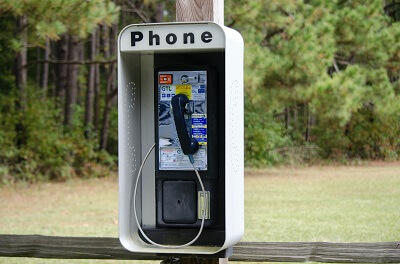Although the telephone is a great convenience that has changed the nature of human interaction, there are many times when phone conversations aren’t so desired and many people just don’t like talking on the phone.

Whether you’re caught in a mood, too busy to talk, or just don’t feel like expressing yourself over the phone, being able to politely convey your disinterest is important in maintaining a relationship that’s not at the expense of your phone interest.
Be honest and state why you don’t want to make a phone call right now. If you have had a stressful day, you can say, for example, “Today was very chaotic; I need some rest first. I’ll get back to you in a few days!”
The following guide will help you to navigate phone etiquette so that you can have the meaningful interactions you desire without constantly relying on a phone.
What to Tell Someone If You Aren’t Interested in the Mood
Phone conversations can be problematic because you aren’t exposed to someone’s body language, there can be a lot of background noise and distractions and it’s easy to get upset just by the words someone is speaking to you. [1] In other instances, you may be overwhelmed and stressed and not interested in talking at that moment, whether because you are sick, you are stressed or you don’t want to speak to that specific person at that moment (perhaps because of some past, lingering tensions).
There are a variety of responses you can offer based on each situation that will help to prevent any tension or misunderstanding.
If You Do Not Feel Well
If you are sick or not feeling well, simply say:
“I am not feeling well right now and I will call you back later.”
This is a fairly universal description that informs your conversation partner of your status without forcing you to have a conversation.
When You Feel Stressed
If you are stressed, whether because of your living situation, bills, relatives, or any number of reasons, you can tell someone:
“Sorry, there’s a lot going on right now and I am a bit stressed.”
Being honest helps to convey your reason for not having a conversation that’s easy to understand and helps to alleviate any concerns that the other person is at fault.
If You Do Not Want to Talk Right Now
If you aren’t interested in talking to that specific person at that specific point in time, whether because this person has caused past angst or just could be a lengthy speaker that requires a substantial devotion of time to have a sufficient conversation, you can offer a reply such as:
“Hey, thanks for calling me. It would be great if we could talk another time.”
This reply helps to diffuse any tension and prepare you for a future conversation if you are still interested in interacting with that person.
Maybe you’re uncomfortable with the situation talking on the phone right now, in which case you could say:
What to Tell Someone If You Are Busy
When you are bogged down with work, life responsibilities, or other commitments, a phone conversation can be an irritant rather than a relaxing way to interact with someone. Given that schedules fluctuate, whether throughout the day or the week, providing an alternative to conversing at that moment creates a degree of flexibility in the interaction so that you don’t feel encumbered and restricted by the present attempt at conversation while the other person doesn’t feel rebuked for calling at that moment.
There are many responses you can offer, whether via text or as a quick phone response, that can convey that you are busy.
“Hey, thanks for calling but I’m really busy right now. Is there another time we can talk?”
A response like this is a simple way to delay a present phone conversation. If you’re rather not even have a phone conversation and would prefer to meet in person or interact by another means, propose this scenario when interacting. You can say something such as:
“It would be great to meet up for coffee and chat with you.”
Indicate a future time where this may occur. If you don’t want to interact with this person at all, saying
“Sorry, I’m busy right now and can’t talk.”
is a perfectly acceptable and commonly encountered excuse for getting out of a phone conversation.
What to Tell Someone If You Are Introverted or Have Anxiety
There are someone people, whether they suffer from phone-related anxiety or are very introverted, who find conversing on a phone difficult. [2]
Phone anxiety may arise from a variety of elements, whether it be over-stimulation after a day of Zoom calls, texting and office meetings that feature abundant conversation; encountering phone conversations during periods of the day, such as after work, where one is trying to decompress; and generational divides that have created tendencies to opt for short, text-based conversations before phone ones.
For introverts, struggles with conversations can range from full-on telephone phobia, or fear of talking on the phone, to the struggles of attempting to convey the intense thinking that coincides with introversion during a phone conversation that can be erratic and interrupt one’s thoughts.
For those dealing with anxiety, a simple response would be:
“Hey, thanks for calling. I had a crazy day, can we talk in a bit?”
It helps to convey interest as well as relay the concerns, such as daily stressors, that are contributing to a present, frenzied state. If your anxieties are just temporary or circumstantial, then such a request is simply guiding the future conversation.
If you always find yourself dealing with stress, then picking a certain period of the day to handle calls or finding another means of interacting with people is best.
For those who are introverted, phone conversations are events that may require a degree of preparation. If you have an alternative to talking on the phone, relaying this to whomever you are speaking by saying:
“I would prefer to discuss this in person.”
This will help to indicate that you are not a phone-oriented conversationalist. If you may not necessarily have the option of an alternative speaking arrangement but can’t prepare yourself at that moment, you may want to propose a better time:
“Now’s not the best time to talk.”
Offer an Alternative
Regardless of why you don’t want to talk on the phone, it’s always a good idea to propose another way to speak with someone if you are trying to maintain a relationship. Choosing an online or phone-based video platform, such as Skype, Zoom, or Facetime, allows a more dynamic conversation approach that incorporates some body language to make it more comfortable.
Some information can be relayed via letter or email, which is a great way of conveying deeper sentiments or concerns, while texts are fine for brief thoughts and ideas.
Meeting in person, and arranging a mutually agreeable date, is also a fine alternative versus speaking on the phone.
Whatever your reason, clearly conveying a polite reason why you don’t want to talk on the phone is often enough to prevent you from having that phone conversation.
Sources:
[1]: https://hbr.org/2017/12/how-to-control-your-emotions-during-a-difficult-conversation
[2]: https://pubmed.ncbi.nlm.nih.gov/17594267/

Sophie Hammond is a journalist, psychologist, and freelance speechwriter for people in politics and business. She lives on the edge of the Rocky Mountains with her dog and a lifetime supply of books. When she’s not writing, she can be found wandering through nature or journaling at a coffee shop.

